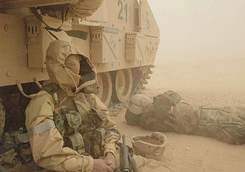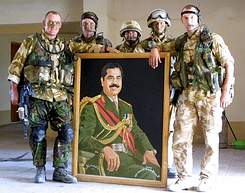 |
 |
U.S. soldiers waiting Tuesday for
a sandstorm to pass in Karbala, 110km from Baghdad.
(Photo: AP) |
 |
 |
 |
British 'Desert Rats' posing with
a painting of Saddam Hussein at the Ba'ath party headquarters
in Basra on Tuesday.
(Photo: AP) |
 |
Fifty percent of the air strikes
being carried out by the allied forces were targeting Iraqi
Republican Guard near Baghdad, said Air Force Gen. Richard Myers,
chairman of the Joint Chiefs of Staff, said Tuesday at a Pentagon
press briefing.
Defense Secretary Donald Rumsfeld, who also
spoke at the briefing, said that U.S. and allied forces have now
taken in "excess of 3,500 Iraqi prisoners."
The defense
secretary said humanitarian assistance "food, water and medicine" is
already being delivered. Still, after five days of ground combat, he
sought to minimize expectations of a swift end to the war
"We're still, needless to say, much closer to the beginning
than the end," Rumsfeld said.
Earlier Tuesday, a top U.S.
commander said about 500 Iraqis have been killed in the last two
days by U.S. Army infantry tanks and mechanized units as they swept
through southern Iraq.
The estimate came from Command Sgt.
Maj. Kenneth Preston of V Corps, who oversees the 3rd Infantry
Division.
Preston said U.S. forces ran into "a lot" of Iraqi
tanks and anti-aircraft weaponry and "thousands and thousands" of
weapons around the city of Najaf.
"This could have been very
ugly, but they're not very motivated," Preston said of the regular
Iraqi army recruits. "I think a lot of them wanted to go home."
Many of the Iraqis appeared to have very low morale, he
reported, adding that family members were seen picking up dead
soldiers and taking them home for burial.
U.S. troops were
stopping civilian vehicles and interrogating people, he added.
Asked about his division's plans, he replied: "Baghdad.
That's where we're going, one step at a time."
The toughest
fighting in the war with Iraq, however, still lies ahead, U.S.
Chairman of the Joint Chiefs of Staff Gen. Richard Myers said
Tuesday.
Speaking on ABC's "Good Morning America" program,
the chairman of the Joint Chiefs of Staff anticipated resistance
would get tougher the closer U.S. troops moved toward Baghdad. "We
think the toughest fighting is ahead of us and we have known that
all along and are we are preparing for that," he said.
Also
Tuesday, a U.S. general said that coalition forces destroyed six GPS
jamming systems they said Iraq had been trying to use to disrupt its
satellite positioning equipment.
"We have noticed some
attempts by the Iraqis to use a GPS jamming system that they have
procured from another nation," Major-General Victor Renuart told a
news briefing at the command headquarters in Qatar of the U.S.-led
invasion.
"Actually we've been able to identify the location
of each of those jammers and I'm happy to report that we have
destroyed all six of those jammers in the last two nights'
airstrikes."
"I am also pleased to say they had no affect on
us. In fact we destroyed one of the jammers with a GPS weapon."
White House spokesman Ari Fleischer said Monday that
Washington was very concerned at reports that Russian firms were
providing GPS jamming equipment to the Iraqis.
Russia has
denied supplying this equipment.
In fighting Tuesday, a
large convoy of U.S. Marines crossed the Euphrates river and Saddam
Canal at Nasiriyah on Tuesday, resuming a key advance toward Baghdad
after fighting their way through the southern city.
South of
Basra on Tuesday, British forces blocked an attempted breakout by up
to 50 Iraqi tanks seeking to press southward from the edge of the
city, destroying five to seven of them, a British naval commander
said.
A British military spokesman said forces captured a
top Ba`ath Party official in the city.
A northward advance
on the far bank of the Euphrates could eventually form the eastward
arm of a pincer movement on Baghdad, 375km north of Nasiriyah. To
the west of the river, U.S. forces are only 100km south of the
capital.
Aiming for Saddam Hussein's seat of power,
coalition planes targeted Republican Guard forces just south of
Baghdad in perhaps the largest assault to date on the Iraqi leader's
highly trained troops, as U.S. officials warned that Iraq could use
chemical weapons if soldiers crossed a "red line" ringing the
capital.
At midday Tuesday, U.S. forces resumed bombings of
Republican Guard troops south of Baghdad, a British official said.
Ground troops pressed toward Baghdad but many were but many
were halted by a sandstorm near the holy city of Karbala, 50 miles
south of the capital.
Also Tuesday, Britain announced a
soldier from its Black Watch 1st Battalion was killed in fighting in
southern Iraq, taking to 20 the number of dead and missing British
troops since the war started last week. Another British soldier who
was also fighting at Zubayr, near Basra, died Monday.
U.S.
forces 80km rom Baghdad pounded military targets south of the Iraqi
capital with howitzers and rockets Tuesday in an all-night artillery
barrage that lit up the clouds like lightning.
Meanwhile,
British forces - a day after coming under heavy attack - declared
that Basra, Iraq's second largest, was now a "military target."
Coalition forces farther south were facing deadly ambushes
and discovering that many Iraqi fighters had discarded their
uniforms for civilian clothes.
U.S. General Tommy Franks
said Saddam's regime was weakened but still issuing orders to
military units - which are not always complying. Franks said his
forces have captured 3,000 prisoners.
British: Umm Qasr
'safe and open'
The southern Iraqi port town of Umm Qasr,
where U.S. and British forces have faced Iraqi resistance for days,
is now "safe and open," a British commander said Tuesday. Brigadier
Jim Dutton, commander of the British Royal Marines' 3rd Commando
Brigade, told reporters he hoped the first ship bringing aid to Iraq
would arrive within 48 hours.
American TV reports on
Baghdad 'red line'
Allied troops' entry into Baghdad itself,
however, could be met with a chemical attack.
American
television stations CNN, NBC and CBS reported Monday that U.S.
officials said the Iraqi leadership has drawn "a red line" around
the map of Baghdad and that once American troops cross it,
Republican Guards have been authorized to use chemical weapons,
Reuters reported.
While a senior Pentagon source said he
could not confirm
the reports, NBC said its information was
coming from intelligence officials who based it on intercepts of
Iraqi communications.
"It's believed once U.S. ground troops
cross the line drawn roughly between Karbala and Al Kut, the
Republican Guards are under orders to attack with chemical weapons,"
NBC said. CNN said the fact that the use of the weapons had
apparently been authorized did not mean they would ultimately be
employed.
British Prime Minister Tony Blair, who will meet
with U.S. President George W. Bush at Camp David on Wednesday, told
the British parliament that the "vital goal" was to reach the Iraqi
capital as swiftly as possible.
Casualty figures after
six days of combat:
The following are figures on the number
of dead, missing and captured since the beginning of the Iraqi
conflict:
American soldiers killed: 20
British
soldiers killed: 18
(Neither American nor Iraqi officials
have released a total number of Iraqi soldiers killed)
Iraqi
civilian casualties: More than 200, according to Iraqi officials.
Iraqi prisoners of war: 3,000, according to the Pentagon.
American prisoners of war: 7, according to Iraqi officials.
Two were captured Monday, Iraqi officials said, when an Apache
helicopter was downed in central Iraq. Five were captured Sunday and
shown on Iraqi television after an attack on an Army convoy.
American soldiers missing: 14, according to the Pentagon.
That figure includes the five soldiers shown on Iraq TV and the two
Apache pilots.
British soldiers missing: 2, according to the
British military. |


